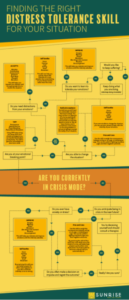Wanting to self-harm
What you can do to get through it:
- Confide in someone you trust and ask for help
- Identify your self-harm triggers and become aware the urge emerges
- Identify effective distractions:
- Rub ice over where you want to hurt yourself
- Sticky tape or plaster your skin and peel it off
- Take a cold bath
- Deep breathing
- Find new and healthy coping strategies
- Keep a diary for your emotions and coping strategies
- Eat, sleep and exercise well
- Notify those around you know what to do in a crisis
- Reach out to a mental health professional
For more information
Project Air Strategy: What is self-harm?
Mind UK – Understanding self harm for a more thorough guideline of causes of self harm, accessing treatment and support, tips for helping yourself now and long-term and guidance for friends and family.
Feeling sad, loneliness and depression
Sadness can be a difficult emotion to deal with and it is possible that it deepens into depression.
What you can do to get through it:
- Confide in someone you trust
- Look after your physical health and hygiene
- Find activities that you enjoy and find relaxing
- Create a resilience list. For example:
- Wrap up in a blanket and watch your favourite TV show
- Massage your hands with a nice-smelling moisturiser
- Write all your negative feelings on a piece of paper and tear it up
- Listen to a song you find uplifting
- Keep a mood diary
- Reach out to a mental health professional
For more information
Project Air Strategy – Managing emotions.
Coping with Depression is a information package designed by the Centre for Clinical Interventions. Download the modules to learn to manage your mood.
Mind UK – Understanding depression for a more thorough guideline of possible causes of depression, accessing treatment and support, tips for helping yourself and guidance for friends and family.
Feeling anxious, tense and panicky
Anxiety occurs in times of fear which includes stress, embarrassment, criticism and rejection. In a period of intense fear, panic attacks can appear unexpectedly and suddenly.
SUNRISE – Finding the right distress tolerance skill for your situation
What you can do to get through it:
- Confide in someone you trust and ask for help
- Look after your physical health
- Try relaxation techniques
- Make yourself a hot drink and drink it slowly, notice the taste and smell, the shape of the mug and its weight in your hand
- Practice breathing exercises
- Do a reality checklist – write down everything you can think about where you are right now, such as time, date, colour of the room, etc.
- Take a warm bath or shower – this can help change your mood by creating a soothing atmosphere and a distracting physical sensation
- Give yourself time to acknowledge the symptoms
- Keep a diary
- Reach out to a mental health professional

BREATHEAWARE – Deep breathing exercise
For more information
Overcoming health anxiety is a set of modules designed by Centre for Clinical Interventions. You can complete these modules to understand anxiety and help you decrease your health worries and concerns.
Project Air Strategy – Managing emotions.
People Sense – Combating stress.
Mind UK – Understanding anxiety and panic attacks for a more thorough guideline of possible causes of anxiety and panic attacks, accessing treatment, tips for helping yourself and guidance for friends and family.
Dissociation and spaced out
Everyone spaces out as a form of escape, however, dissociation becomes a problem when it interferes with your daily life or leads you to risky behaviours. In the beginning, you probably would not realise that it happens until someone else notifies you.
What you can do to get through it:
- Look after your physical health
- Keep a journal
- Visualise safe places
- Practice grounding techniques. For example:
- Chew a piece of ginger or chilli and notice the strong smell and taste
- Clap your hands and notice the stinging sensation
- Drink a glass of ice cold water
- Walk barefoot
- Do a reality checklist – write down or say the time and date
- Notify those around you know what to do in a crisis
- Reach out to a mental health professional
For more information
Project Air Strategy – Managing distress.
Overcoming distress intolerance is a set of modules designed by Centre for Clinical Interventions. You can complete these modules to understand about distress and help you distressing or uncomfortable feelings more effectively.
Angry outbursts and prolonged frustrations
Anger is a normal human emotion, however, if uncontrolled or persists over a long time period it can be destructive and this can be frightening for you and those around you. Therefore, time is critical to calming down to dissipate the anger.
What you can do to get through it:
- Identify triggers
- Look out for the warning signs in your body
- Give yourself time out to think
- Try “cool down” techniques. For example:
- Breathe slowly
- Rip up newspaper
- Hit a pillow
- Throw ice cubes into the bath so they smash
- Visualise a relaxing memory or use your imagination
- Control your thinking by cognitive restructuring, problem solving, better communication and humour.
- Practice anger management skills
- Eat, sleep and exercise well
For more information
Australian Psychological Society – Managing your anger.
Interpersonal Effectiveness is a set of modules designed by Centre for Clinical Interventions. You can complete these modules to understand about anger and stress and learn to cope with anger and stress more effectively.
Project Air Strategy – Managing anger
Mind UK – How to deal with anger for a more thorough guideline of possible causes of anger, accessing treatment and support, tips for helping yourself now and long-term and guidance for friends and family.
Alcohol and drug use
People consume alcohol and drugs for various reasons – relaxation, focus, fit in, feeling bored, curious, escape problems or relief from emotional distress. Recreational substances affect the way you see things, your mood and your behaviour. There are health, vocational, criminal, relationship and financial dangers with over consumption of substances and taking illegal drugs. It is difficult to accept you may have a problem and ask for help. Be honest with yourself and others and get the help and support you need.
What you can do to get through it:
- Recognise when your substance use has become a problem
- Confide in someone you trust and ask for help
- Investigate suitable treatment and support options near you
- Find alternative healthy coping strategies
- Eat, sleep and exercise well
- Deal with setbacks and keep going
For more information
Project Air Strategy – Problems with alcohol & drug use to identify signs and effects of substance misuse and ways to cope with cravings.
Mind UK – Understanding mental health effects of recreational drugs and alcohol for guideline of effects of alcohol and drugs, what might happen if you have dual diagnosis with a mental health problem, accessing support, and guidance for friends and family.
Emotional distress
People with BPD spend a lot of energy fighting emotional dysregulation, so acceptance of your condition may be difficult. Accepting your emotional responses does not mean approving them or resigning yourself to suffering. It means to stop fighting, avoiding, suppressing or denying your feelings and therefore reducing their power of overwhelming your rational thinking.
Practicing mindfulness techniques can be very effective in letting go of the past and future and exclusively be in the present moment without judgement or criticism of your emotional impulses.
- Observe your emotions from the outside.
- Watch your emotions come and go.
- Tune into your bodily sensations that come with the emotions.
- Tell yourself that you accept the emotions you can feel.
- Remind yourself that just because you’re feeling something doesn’t mean it’s reality.
For more information
Very Well – How to effectively handle stress with BPD.
Project Air Strategy fact sheets What is Mindfulness?
Please see this link for an introduction to practicing Mindfulness.
For mindfulness exercises download the following Project Air Strategy sheets:
Effective communication
Expressing yourself to others can sometimes be challenging. Reading verbal and non-verbal language can be particularly more difficult with BPD. Remember to respect other’s voices and that you’re not always going to get it right. Effective communication is a skill that requires practice beginning with being clear and open about your own thoughts and feelings to maintain good relationships with others. Download Project Air Strategy – Effective communication and Project Air Strategy – Relationships difficulties, arguments & conflicts.
Daily self-care
It is important to look after your physical and mental health. This will give you the best chance to managing difficult emotions and situations and to live a fulfilling life. Download the Project Air Strategy – The importance of self-care.
For more information
Online Community
Australian BPD Foundation – WeCanOnline
Are you interested in being part of an informal online ‘community of peers’ group for people with the diagnosis of BPD? The purpose of the group is to raise awareness of the diagnosis of BPD and the effects this has on people. WeCanOnline also want to have a collective voice to lobby for better access, treatment options, and more receptive or specialised BPD services. Press the link to complete a survey before joining.
Borderline Personality Disorder Support Group
This online support group welcomes all individuals. The forums are community-lead and not staffed by mental health professionals.
This is a safe arena for those with mental illnesses and disorders (specifically BPD) to share concerns, voice opinions, seek like-minded individuals working toward recovery, discuss medications and therapy approaches, and explore the impact of their illness(es) have had on their life and the lives of their loved ones. The tools promoted here are mostly CBT-based. As mentioned, you need not have a formal diagnosis to participate or benefit from the resources offered here. All are welcome.
The Lived Experience Forum is a safe, anonymous community for people living with mental illness, moderated 24/7 by mental health professionals.
This community is all about supporting and learning from each other for all those affected by a mental health-related concern. To reply to posts or start a new thread, you’ll need to be a member. Forum memberships is open to anyone residing in Australia. These forums are community-led and not staffed by mental health professionals.
This free UK-based online community is a place to offer as well as receive support. It is a safe place to yourself, where you can listen, share and be heard. Anyone over 18 can join. The community is moderated by handlers at Mind UK. It is available for users on desktop, iPhone and Android.
Resources
The resources below are not meant to replace professional mental health services.
Sunrise – DBT Distress Tolerance Skills: Your 6-Skill Guide to Navigate Emotional Crises includes quick tips and videos to help you get to a more manageable emotional place for crisis survival.
Supplementary Materials for DBT® Skills Training Handouts and Worksheets: Second Edition A complete set of DBT skills training handouts and worksheets for use as suggested by your therapist. You may download and print any or all of these handouts and worksheets for your personal use. If you have questions about how to utilise the handouts and worksheets, please ask your therapist.
Coping with BPD for management strategies.
DBT Peer Connections Skills Training Academy is a free online course created by peers for peers dedicated to improving their emotional health through daily DBT skills practice. The e-course is interactive with videos, reflection journal, diary cards and quizzes.
DBT Peer Connections has links to DBT handouts, worksheets and to a private peer support facebook community.
Centre for Clinical Interventions have information packages that you can download to work through for your concerned mental health condition.
BreakAway MHE – the 9-steps includes a portrayal of real life BPD experience (author’s experience) with the goal to assist with understanding how BPD develops, as well as to teach principles and skills to promote self-awareness and self-mastery.




